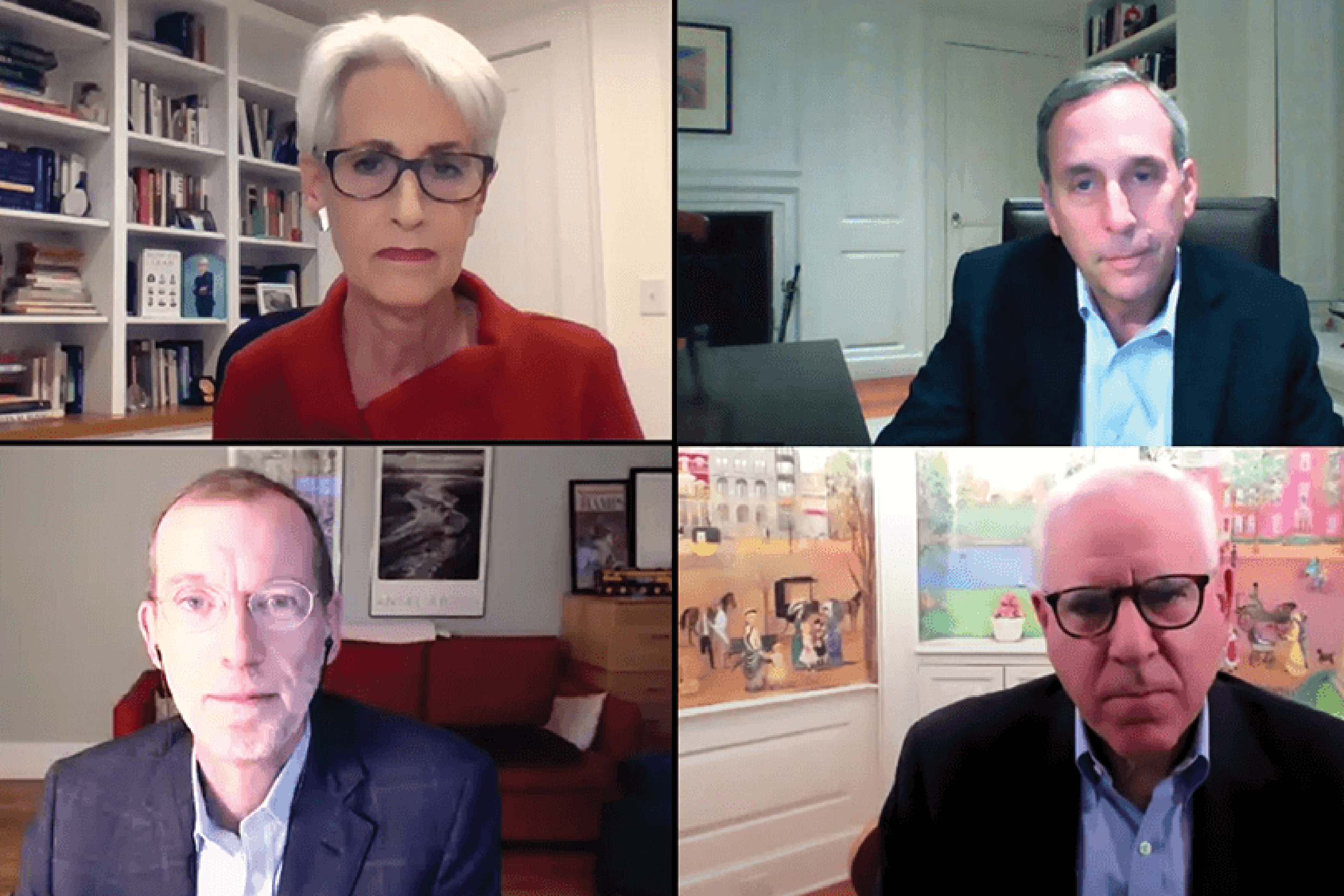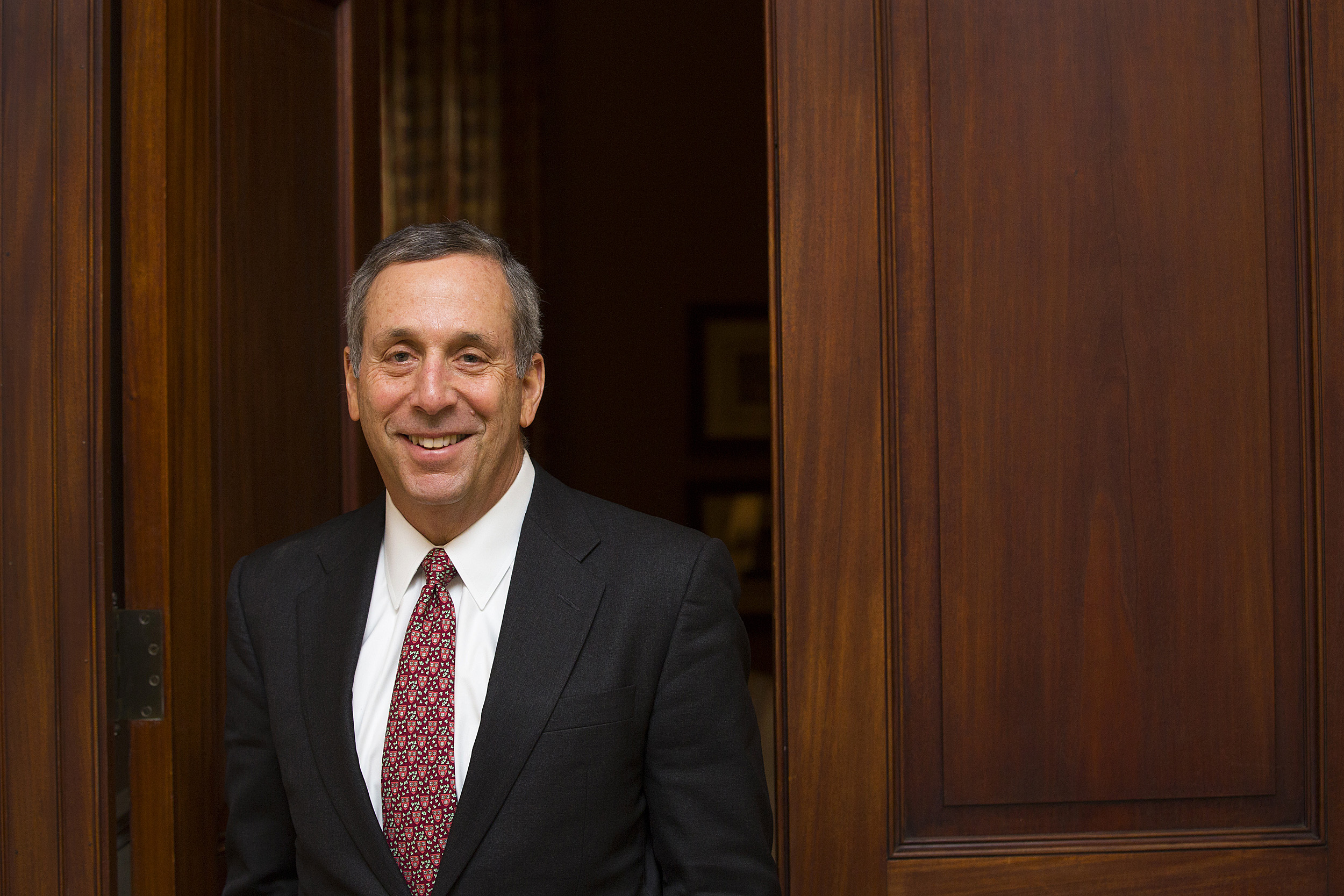
(Clockwise from top left): Wendy Sherman, Larry Bacow, David Rubenstein, and Doug Elmendorf in conversation about the role of leadership.
A master class in leadership
David Rubenstein and Larry Bacow discuss importance of failure, value of diversity, and importance of heeding new ideas
Each now stands astride a world-leading institution. But the paths they started on did not seem to point that way. David Rubenstein, co-founder and co-executive chairman of The Carlyle Group, was a lawyer, and not a successful one to hear him tell it. Larry Bacow, president of Harvard, spent 21 years focused on researching and teaching at MIT and “studiously avoided any opportunities to be a department chair or dean or anything else.”
When they changed course and embarked down their respective roads to positions of leadership, it was for a chance to make things better. Rubenstein and Bacow spoke at Monday’s virtual forum, “The Leadership Playbook: Insights from Great Leaders,” sponsored by Harvard Kennedy School’s (HKS) Institute of Politics and Center for Public Leadership. HKS Dean Doug Elmendorf introduced the event, which was moderated by Wendy Sherman, director of the Center for Public Leadership and professor of the practice of public leadership.
“To be a leader, I think you have to be good at something, and to be good at something, you have to really enjoy it,” said Rubenstein, who also serves as a fellow of the Harvard Corporation. “I didn’t enjoy the things I was doing before [the Carlyle Group], certainly not the practice of law, and the practice of law didn’t enjoy me.”
Rubenstein was quick to admit luck, and making your own luck, helps. But to capitalize on what luck comes your way requires focus, vision, humility, communication skills, and exercising your brain, said Rubenstein, whose new book is “How to Lead: Wisdom from the World’s Greatest CEOs, Founders, and Game Changers.”
“You can’t assume when you graduate from graduate school or college you know everything you need to know. You have to keep reading and reading and reading and exercising your brain so that you have more knowledge and you can keep up with what’s going on,” he said. His final, but perhaps most important attribute: honesty.
Bacow echoed the importance of honesty, integrity, character, and quality of mind. He also added good taste, the power of persuasion, and the importance of being a team player. “As leaders, you need to be able to both assemble a team, but also be part of a team,” Bacow said. “There is no leader who’s not part of a larger team. People who make leadership about themselves as opposed to the organization or the institution long-term, will not succeed.”
University President Larry Bacow.
Stephanie Mitchell/Harvard file photo

Sherman noted that leadership springs from success, failure, and taking risks. Rubenstein agreed. “What you need to do is learn how to fail,” he said. “And failing is good because you’ll pick yourself up, you’ll learn from it. Everybody I interviewed in the book liked to talk about their failures. Why? Because, to some extent, it shows humility. But also, that’s where they really learn things. So if you’ve never failed in life, you’re not likely to be that successful in life.” Bacow added, “If you have never failed at something you haven’t tried to do something that is really hard and challenging.”
Turning to the question of diversity, Sherman asked what leadership will look like in a world where the majority is non-white. Rubenstein acknowledged discrimination existed for much of the United States’ history, if you weren’t white, Anglo-Saxon, and Protestant. “The world has now changed and we now recognize that if you are going to compete in the world, if you’re going to recognize the value of everybody and take advantage of it in an appropriate way, you have to reflect the diversity of society,” he said. “If you’re not prepared to do that, you’re going to be left behind.”
“Diversity is the pathway to excellence. You will never succeed as well if you sample from only a small set or slice of the talent,” Bacow said. “If everybody thinks the same way, if everybody has the same point of view, the same perspective, we won’t accomplish nearly as much as if we bring people together who can debate issues, have different points of view, different life experiences, and different images of the future.”
Both speakers stressed the value of incremental change. “Most humans don’t like change,” Rubenstein noted. “It is historically easier to make change in an incremental way. Thurgood Marshall made incremental changes before he got to Brown vs Board of Education. Ruth Bader Ginsburg preferred to make incremental changes in gender equality because she thought trying to take on gigantic swaths of that issue would have made it very difficult to prevail. Incremental changes are more likely to be the thing of the future as well because it’s going to be harder and harder to overcome the enormous resistance.”
Juliahna Green, M.P.P. 2022, asked about older, white stakeholders’ resistance to engaging with young people. Rubenstein reflected that persistence with the appropriate respect might make a difference. And he offered a failure to heed young ideas from his own experience.
He recollected how his son-in-law, then a student at Harvard College, came to him with an investment opportunity: a classmate was starting a company that helped people date at Harvard and maybe other colleges. “I said, ‘Look, no college kid is going to have a company good enough for me to want to invest in. And I’m not going to take my Carlyle Group professionals and waste their time.’ So I said, ‘I don’t want to meet Mark Zuckerberg. I don’t think that’s going to get anywhere.’”




